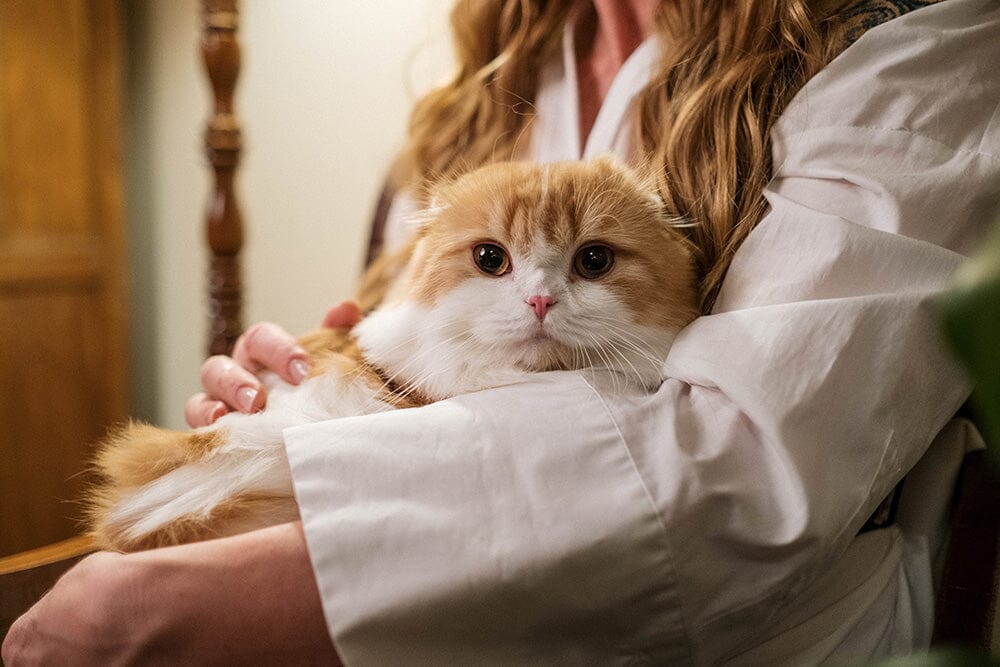Many people believe cats are low maintenance and can take care of themselves. While that is somewhat true, it doesn't mean that cat parents can relax while the cat heads off to attend the regular vet appointment by themselves. (Imagine that!)
As the parent, or in this case the pet-parent, it is up to you to look after your kitty cat and make sure they stay happy and healthy. In order to do this, you'll want to make sure you avoid some common mistakes cat owners make that can harm your fur feline.
If you are a new time cat owner it's worth knowing what things you need to watch out for. And even if you are a long time pet owner, there are still things that you may be doing today (unintentionally of course) that can lead to problems down the road.
In both cases, being aware of the biggest mistakes many cat owners make can help prepare you to be the best parent to your cat. And don't we all strive for that.
WHAT CAT OWNERS SHOULD NOT DO
Cats are complicated creatures and can be quite mysterious to new cat parents. For example, a rescue cat hiding under the sofa may be normal, but this kind of behavior appearing out of the blue may be a cause for concern.
Don’t worry, you don’t have to deal with this on your own. Read on to find out how to better understand your cat, what cat myths are not true, and what mistakes to avoid when taking care of your cat.
Getting Your Cat Declawed
While it may seem easier to remove your cat's claws than risk them scratching the furniture, declawing is considered animal abuse in many countries. A cat's claws are joined to the bone, so when you get them declawed, their bone comes off with it.
It is a painful, inhumane, and unhealthy procedure: cats need their claws for many things, including protection and balance. Fortunately, this practice is gradually getting recognized as animal cruelty and is banned in Maryland and New York - hopefully, the rest of the US will follow suit.
Ignoring Dental Care
Another mistake cat owners make is not caring for their cat's oral hygiene.
Tooth brushing is not just for humans; a dirty mouth and teeth can put cats and kittens at risk of various dental diseases. Given a cat's sharp claws, brushing their teeth is something many cat parents try and avoid, but this is actually to the cat's detriment. It may take some finesse but there are lots of reasons why brushing your cat's teeth is worth the effort.
To help, first-time pet owners can ask their vet for tips regarding teeth cleaning services. Later on with some practice you can even learn to brush their teeth at home - all you need is a little patience! You can start with gently brushing their teeth up to three times a week, the minimum recommended amount, and work up to daily brushing.
Maintaining oral hygiene is very important to prevent issues such as red and bleeding gums, tartar, plaque and periodontal disease. That's where a natural anti-inflammatory dental treatment might help.

In addition, if your cat's breath smells like they are eating fish all day (even when they aren't), keeping your cat's mouth clean and free from bacteria will help with the icky smell too.
Only Giving Dry Food
One of the most common mistakes pet parents make is giving their cats dry food only. Most do it because of the convenience, but they don't realize that giving cats wet food, even occasionally, can help them stay healthy and reduce unnecessary calories.
Cats do not drink a lot of water and therefore need a diet that gives them moisture. This can be done through a variety of wet foods. If you are serving dry food because of ease, try automatic feeders for wet food, so you don’t need to worry about convenience.
Giving Cats Milk
Contrary to popular belief, store-bought milk isn't the best food for adult cats and even kittens. Many cats are lactose intolerant, and it is hard for them to digest cow milk. This can cause the poor kitty to have stomach cramps, get diarrhea, or vomit.
If you've rescued or adopted a very young kitten, you can instead buy kitten milk replacement (KMR) formula online or at a pet store. Typically, kittens will only drink their mother's milk (or a substitute) until they are 4-5 weeks old.
Not Introducing Them to Other Cats in the House
Cats are territorial animals and will not instantly warm up to the new cat in the house. A new cat is a threat; if the two cats aren't introduced properly, they may become aggressive and harm each other. It can be difficult to manage constant squabbles, so help your cats socialize with each other so peace can prevail.
In the beginning it is best to keep the two cats away from each other for a few days. You can begin the introduction by swapping an item that is close to both of the cats, like a toy or blanket. This will help them familiarize themselves with each other's scents.
Leave the familiar item nearby; it is better not to hand the item directly to them or bring it too close because the unusual scent will make it seem threatening.
Once they get used to the smell, you can have them meet each other. The best way is to start at a distance, especially when dealing with a kitten. For further reading, American Humane has some more tips on what to do in the early stages of cat-to-cat socialization in this article.

Not Learning Common Cat Behavioral Signals
Every cat is different just because your friend's pet is friendly and loves to cuddle doesn't mean yours will too. Learning about common cat behaviors will help you understand certain cues from your kitty. It will also show you that you cannot expect your cat to behave in a certain way because every cat has their own personality, much like humans.
Once you figure out how your cat typically behaves, you will be able to communicate with them much better, and you’ll form a stronger bond with your furry friend.
Believing in Myths
One of the most basic mistakes cat owners make is believing in the all-too-prevalent myths about cat care. Unfortunately, there are many untrue myths surrounding these adorable furballs. Most of the common mistakes pet parents make are due to believing in these baseless myths about cats.
The following are some of the debunked cat myths people tend to believe:
Kitties don't need baths. They might not need a bath daily, but your cat requires proper grooming and cleaning, just like other pets.
Cats love milk. (Refer to the point above)
Cats don't need physical activity. Cats need to be active, like every living being. This helps them keep fit and improves their mental and physical health.
Cats always land on their feet. They do, but not always. If a cat falls from a significant height, they might not be able to follow their instinct of turning their neck in time.
Not Playing With Your Kitty
A cat's aloof nature might make you think that they don't like to play, but contrary to popular belief, they like playing when they feel like it. A dog might be up for a game of fetch any time, but cats are a little different. In fact, most of the time, first-time pet parents don't even realize that their kitty is trying to play with them.
Cats love a good game of hide and seek. Our cheeky little kitty likes to tap our hand and then pretend she didn't. Look out for signs that indicate your cat wants to play and reciprocate. This will also help you improve your bond with your kitty.
In addition to this, playing with your kitty keeps them active. Physical exercise is beneficial for their health. An active kitty is less likely to develop diabetes, obesity and arthritis.
-
Kitties don't need baths
While it is true that cats clean themselves by licking, they aren’t able to reach everywhere. Your cat might not need a bath daily, but they require proper grooming and cleaning, just like other pets to keep their skin and fur healthy.
-
Cats don't need physical activity
Cats need to be active, like every living being. This helps them keep fit and improves their mental and physical health. If you’re keeping your cat indoors, they would still benefit from regular exercise or playtime.
-
Cats always land on their feet
They do, but not always. If a cat falls from a significant height, they might not be able to follow their instinct of turning their body in time. Don’t drop your kitty to test this myth!

Not Playing Enough With Your Cat
A cat's aloof nature might make you think that they don't like to play, but cats and kittens love playing when they feel like it. A dog might be up for a game of fetch any time, but cats are a little different. In fact, most of the time, first-time pet parents don't even realize that their kitty is trying to play with them.
Some cats love a good game of hide and seek. Other cheeky little kitties like to tap our hand and then pretend they didn't. Look out for signs that indicate your cat wants to play and reciprocate. This will also help you improve your bond with your kitty.
In addition to this, playing with your kitty, no matter their age, keeps them active and healthy. Contrary to popular myths, physical exercise is necessary for their health. An active kitty is less likely to develop diabetes, obesity and feline arthritis.
Not Knowing What and How to Feed Your Cat
First-time pet owners are often unaware of a typical feline’s diet. What should you feed your cat? Do they need to eat vegetables? Can they eat people food?
Even seasoned cat parents after a while tend to start getting lax when it comes to giving their cat treats or the wrong foods. Too many, or the wrong kind of cat treats can cause many health issues down the road.
With more and more people turning to various diets such as vegan, vegetarian, etc. in order to keep themselves healthy, sometimes they start feeding their cats the same type of diet. However, it is important to remember that cats are carnivores and get most of their nutrients from animal products. A well-balanced diet for cats contains minimal carbohydrates, a lot of protein and a moderate amount of good fats. Many people make the mistake of feeding cats a high-carb diet which can be harmful and cause multiple health problems. If you are considering a low protein diet for your cat, look into other supplements that will give them the nutrients they may be lacking.
Another common mistake cat parents make is leaving food out all day. This leads the kitty to engage in free feeding. The term refers to feeding cats all day whenever they want and however much they want, which can cause chronic dehydration, diabetes, obesity and lack of appetite.
Serving the Food in the Wrong Bowl
Does your kitty only eat a bit of their food from the bowl and leave? It might be because of their whiskers.
If your kitty's whiskers keep touching the bowl, they will likely stop eating mid-way. Cat's whiskers are very sensitive, which prevents them from eating if they keep getting in the way.
When buying a bowl for your cat, ensure the diameter is not too small so they can comfortably eat from the bowl without it touching their whiskers.
Another issue may be that they eat too quickly. If this is the case then look for a fun puzzle bowl, or one that has an obstacle course which will get them to slow down as they try to get the food out from between the obstacles.

Not Cleaning the Litter Box Regularly
One of the most common mistakes pet parents make but should definitely avoid is not keeping their kitty's litter box clean. In order to ensure your kitty is living in a hygienic environment, you must make sure they are doing their business in a clean space.
Cats like to stay clean, so when you don't clean up their mess, they will simply find a clean spot in the house to empty their bowels. To prevent this from happening, clean up after your cat every time they poop in their kitty litter.
Setting up the cat litter box properly and taking care of it is very important for keeping your kitty healthy. Make it a habit to clean up the tray each morning. Also, wash the tray completely when replacing the litter to avoid any health issues for yourself or your cat.
Lastly, if you have more than one cat, consider getting a separate litter box for each. This will ensure they have no territorial issues, and you won't have to scrub the carpet every time you forget to clean up after one of the cats.
Mistakes Pet Parents Make With Rescue Cats
Many pet lovers want to help give a home to as many animals as possible, but it is essential to understand that rescue animals need special care.
To ensure you can handle a rescue cat, speak to a friend, vet, or shelter employee who has experience with rescue cats and is aware of their needs. This will assist you in understanding how to make the kitty feel at home and what behavior to expect from your new furry friend. For example, while rescue cats can thrive in calm, supportive environments, at first they might be scared and often react negatively to unpredictable behavior.
One of the biggest mistakes people make when adopting rescue animals is bringing them to a home full of other pets or children. Kids are impulsive and unpredictable. Their sudden actions and noises, like crying or screaming, can stress out the rescue kitty. Remember, your rescue cat won’t know this is their new home. Your house is a new, strange place, and they don't know who to trust.
That's not to say that you can't add a rescue kitten or older cat to your existing home, just remember to go slow when getting them accustomed to their new home. Treat them lovingly, recognize their boundaries, and show them that you are there to help, so they can get comfortable and eventually feel safe and happy with you and your family.
What Not to Do with Feral Cats
Sometimes a feral or a stray cat may wander onto your property and you want to help care for them. This is wonderful, but make sure you are prepared as taking care of these wild cats is a lot of effort. Trap-neuter-return (TNR) programs aimed at reducing the number of unwanted cats by catching and then neutering or spaying them are great, but if you want to get involved make sure to learn all that is required to properly capture these cats in a way that does not cause them harm.
Some people think that capturing and relocating these animals is the answer, but be aware that these cats will gather where there is food, water, and shelter. If you try to move an existing colony to another location that does not have access to these resources they may not survive. There is also the chance that another group of cats will, before long, take their place.
One of the biggest mistakes first time cat owners make is trying to bring a stray cat into your home and turn them into indoor cat. This can cause the cat a lot of stress as they are not used to that environment and will most likely run away (if you can even get them in the house). The best thing for feral cats is to either contact a local TNR or rescue program.
The Last Word!
A little tip as a fellow pet owner is to bring your furry friend to the vet when you take them into your home. Ask them the best way to provide your cat with a good quality of life, so you can make the right decisions and avoid the mistakes cat owners make.
Understanding your kitty can be difficult in the beginning, but learning about them will bring you two closer together.
Want to know more about how to help your new cat adjust and live their best life, check out these tips to keep your cat healthy, no matter their age.



